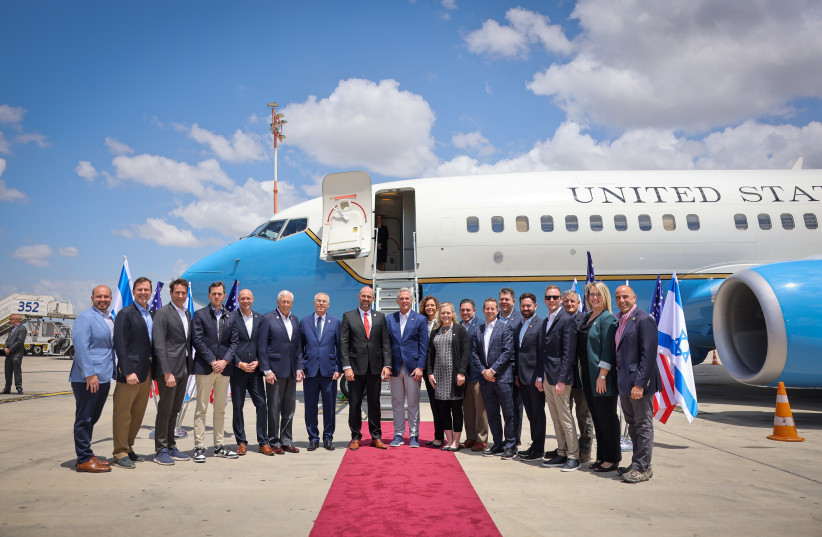It is a rare day when the White House seems almost irrelevant in the relations between nations.
But US Republican House Speaker Kevin McCarthy and his bipartisan congressional delegation that visited Israel this week managed to give that impression – and in this case, it was not a good thing.
If anything, their visit was like a welcomed summer rain after a long period of drought. The trip was designed to celebrate Israel’s 75th anniversary and the nation’s strong bond with the United States.
The timing, however, meant that the visit took place amid one of the most contentious periods of domestic turmoil in Israel’s history and a time of rising tensions between Prime Minister Benjamin Netanyahu’s government and the White House.

US President Joe Biden has opposed Netanyahu’s judicial overhaul plan, which he fears will weaken Israeli democracy, and has so far refused to issue the traditional White House invitation typically extended to Israel’s prime minister after forming a new government. The absence of the invitation was a public branding of the dispute with serious security overtones, as it indicated a rift precisely at a time when a united Israeli-US front is needed against Iran.
There is no way around it, an Israel that is distant from its primary security partner and historical ally is more vulnerable to regional and global enemies.
A prime minster who bungles that relationship is a leader who appears to be losing control, not just domestically but also internationally. Just two nights ago, Spanish Prime Minister Pedro Sánchez issued a virtual address to an anti-judicial reform rally in Tel Aviv.
“Our values are your values. Our heritage is your heritage. Our dreams are your dreams,”
US House Speaker Kevin McCarthy
The perfect antidote: A diplomatic hug
McCarthy’s bipartisan delegation was the perfect antidote to counter that image of an increasingly isolated Israel, shut out even from the White House. If there is such a thing as a diplomatic hug, then this was it.
Biden might not be speaking to Netanyahu, but other Democrats are, such as Congressman Steny Hoyer of Maryland, who traveled with McCarthy, and House Minority Leader Hakeem Jeffries, who visited last month.
A one-on-one dialogue behind closed doors is not enough here. The seminal moment of McCarthy’s trip that mattered most was his address to the Knesset plenum. The only other House speaker to do so was Newt Gingrich in 1998, who also arrived with a bipartisan delegation to celebrate Israel’s 50th anniversary.
This was McCarthy’s first foreign trip as House speaker, a fact that underscored the importance Israel holds for his foreign policy agenda. The speech he delivered, which was interrupted by multiple rounds of applause, hit all the correct notes, as he spoke of the special bond between the two countries and the historical and religious significance of the Jewish people’s return to its ancestral land.

“Our values are your values. Our heritage is your heritage. Our dreams are your dreams,” McCarthy said.
His position as the figurehead of Congress, with 435 politicians representing 50 states, gave his speech added weight. When he spoke to the Knesset, a 120-member body, it was as if the people of both countries were holding a joint conversation.
It was a testament to the width and breadth of the complex relationship between Israel and the American people, which is so much larger than just that of the two governments or Netanyahu’s Jerusalem office with Biden’s White House.
“I chose to come here now, today, to celebrate the bond between our two countries and to reaffirm that bipartisan support for Israel in Congress is at the foundation for our truly special relationship,” McCarthy told the Knesset.
His words were a reminder that the US Senate and House of Representatives have often been core pillars of support for the Jewish state in Washington, at times much more so than the White House or the State Department.
McCarthy didn’t just come to Jerusalem, he also came to the Middle East, at a time when US influence appears to be waning, as China’s seems to be gaining, particularly with the deal it brokered to restore ties between Iran and Saudi Arabia. His speech, therefore, also addressed the larger region and the globe.
He mentioned Beijing in warning that the Chinese Communist Party was stealing US and Israeli technology. He mentioned Iran as he spoke of the importance of remaining resolute against its nuclear threat and pledged to fully fund Israel’s security needs.
If Israel’s enemies thought the US didn’t have Israel’s back, then here was McCarthy to remind them that he did.
McCarthy also underscored that the US-Israel dialogue did not end with this visit, but would continue with an expected address by President Isaac Herzog to a joint congressional session this spring or summer.
He was blunt about his willingness to continue the dialogue with Netanyahu, noting that he would be happy to host him in Washington for a bipartisan conversation.
The fact that McCarthy is a Republican and Biden a Democrat did play somewhat into the narrative of the growing Republican bond with Israel and a fraying Democratic one.
Despite this, McCarthy’s visit seemed to overshadow divisive political debates on both continents, focusing instead on a future made brighter by a shared mission of two democracies. It was a win for Knesset Speaker Amir Ohana, who invited McCarthy, met him at the airport and was instrumental in organizing the event.
It was even more of a victory for Netanyahu, placing him once again in the center of a major US-Israel political event. He has always known how to expand the US-Israel debate to his advantage, playing in particular to Congress. In 2015, for example, Netanyahu bypassed former US president Barack Obama to speak to a joint congressional session about the dangers of the pending nuclear deal with Iran.
In the past weeks, Netanyahu has given a number of media interviews in appeals to the American public, but they paled in comparison to the success of Monday’s bipartisan congressional visit.
At the end of the day, it’s impossible to ignore a US president. When the dust settles from this visit, the tension with Biden will likely once again dominate the debate on Israel-US relations.
But with McCarthy’s visit, Netanyahu showed that the road into the heart of the American public and its political echelon does not always run through the White House.
